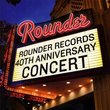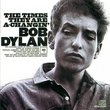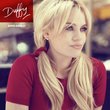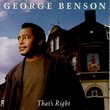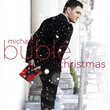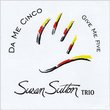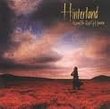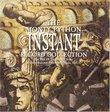| All Artists: Thelonious Monk Title: Criss Cross Members Wishing: 1 Total Copies: 0 Label: Sony Release Date: 8/19/2003 Album Type: Extra tracks, Original recording reissued, Original recording remastered Genres: Jazz, Pop Styles: Modern Postbebop, Bebop Number of Discs: 1 SwapaCD Credits: 1 UPCs: 074646353721, 5099751335627 |
Search - Thelonious Monk :: Criss Cross
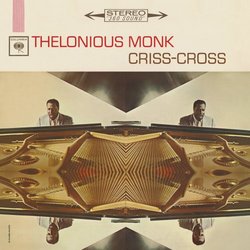 | Thelonious Monk Criss Cross Genres: Jazz, Pop
|
Larger Image |
CD DetailsSimilarly Requested CDs
|
CD ReviewsMy Favorite Monk Album Ren | Knoxville, TN United States | 07/28/2004 (5 out of 5 stars) "Thelonious Monk had signed with Columbia Records in the early 60's; because of this, he was able to get his music out to many more listeners than he could with his previous labels. His first studio album for Columbia is entitled Monk's Dream, and it introduced him to a lot of new listeners who had never heard of him. Criss-Cross is his second studio album for Columbia, and it is an awesome follow-up. In my opinion, it is better than Monk's Dream. Monk's Quartet here is: Charlie Rouse on tenor sax, Thelonious Monk on piano, John Ore on bass, and Frankie Dunlop on drums. This album is mainly Monk originals with the quartet, but there are also two standards which Monk interprets brilliantly. The compositions by Monk are always brilliant. His best songs on this album are the dark and jagged "Criss-Cross", the slow and swinging "Pannonica", the sparse and colorful "Crepuscule with Nellie", and uptempo boppish "Eronel". But "Rhythm-a-ning" is also awesome because Monk puts a very original rhythmic melody to the rhythm changes, which is a bop cliche'. Also, "Think of One" demonstrates Monk's ability to make one note an interesting and catchy melody. So, I would say this album is a superb showcase of his compositions. However, this album demonstrates something else about Thelonious: his ability to take a standard and transform it to make it sound like he wrote it. The main example of that is trio performance "Tea For Two". It starts with the bass playing the verse with only the drums. Then Monk comes in with the chorus, and you can tell he has done a lot of harmonic thinking with this. Another standout is his solo piano performance of "Don't Blame Me". Monk is one of my favorite solo piano players becuase of his ability to make every song interesting and different while still sounding like Monk. "Don't Blame Me" is darker and more dissonant than the original melody is; Monk's alterations here remind me of "Monk's Mood". The bonus tracks here are also interesting to listen to. Two out of the three are alternate takes, but "Coming on the Hudson" is another Monk song with unorthodox metric structure (A sections are 5 bars long, and the bridge is 3 1/2 bars long). I can see why this didn't make the cut on the album because Rouse sounds like he is trying desperately to hang on to the odd form. But, the composition sounds very natural and is very catchy even for its unusual structure. I would recommend this album to all jazz fans, especially those who haven't gotten much into Monk. If you're only going to own one Monk album the rest of your life, own this one." Another great set from Monk. Michael Stack | North Chelmsford, MA USA | 10/05/2005 (4 out of 5 stars) "For a legendary composer, Thelonious Monk seemed to get an awful lot of mileage out of the same songs-- given that he released dozens of albums with less than eighty compositions, this is no surprise. What IS surprising is how Monk could take these pieces and construct album after album of high quality music. Case in point, "Criss-Cross". His second album for Columbia, recorded over five sessions in late 1962 and early 1963, features his then-working band of Charlie Rouse on tenor sax, John Ore on bass, and Frankie Dunlop on drums, and they run through a handful of Monk originals and a pair of standards. Everything on here had been recorded before, but somehow yet again Monk gets even more out of his compositions. Take opener "Hackensack"-- Rouse is so dry, brittle and edgy in his performance that Monk sounds as edgy as he normally does comping straight behind him. This contrasts against "Rhythm-n-ing", where Monk splatters beneath Rouse's breathy, lower register playing and Dunlop steals the show in his unnervingly brilliant performance. Likewise, fantastic perforamnces of standard "Don't Blame Me" (on solo piano, where Monk shows his strengths in patience and space), "Pannonica" (with a particularly angular solo from Rouse) stand out nicely. This reissue is augmented by three bonus tracks-- a performance of the rarely heard "Coming On the Hudson" (which was originally recorded during these sessions but not used on this album) and a pair of alternate takes. All of the material is remastered (and sounds as if it could have been recorded yesterday), and both the original and new liner notes are included. Invariably, Monk manages to put forth strong performances time and again. Recommended." THE place to start your Monk collection R. J. Marsella | California | 12/25/2003 (5 out of 5 stars) "A great remastered version of one of Monks' masterpiece recordings. Every selection here offers something unexpected and the entire CD swings like crazy. Monks comping on the title track Criss Cross behind Charlie Rouses's temor is something to behold. he is never where you think he's going and yet melodic and perfectly in the tune. This guy was really something special and this CD offers a chance to hear him at his peak. Buy it..you can't go wrong here."
|

 Track Listings (12) - Disc #1
Track Listings (12) - Disc #1